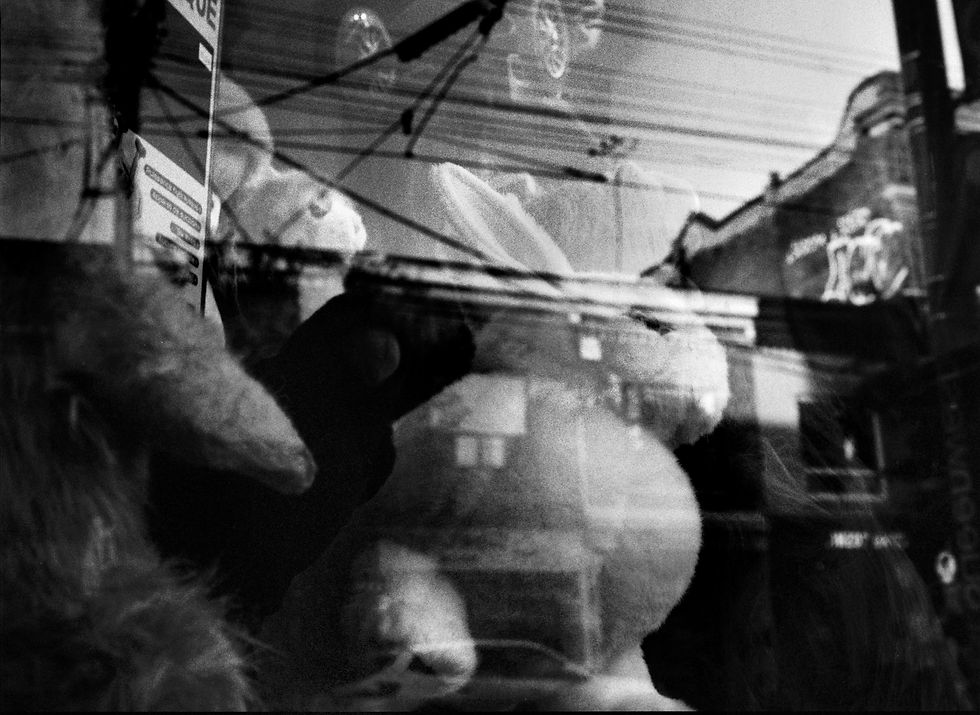An Interview with Yu-Sheng Chiu - Photographer
- MAC CAM

- Aug 29
- 4 min read
Yu-Sheng Chiu (b. 1999) is a photo-based artist living in Ottawa, Canada. Born in Taiwan just before the new millennium, she uses self-portraiture to explore the complex intersections of her identity as a Taiwanese woman and artist within today's challenging political and artistic landscapes.

Her practice is fundamentally driven by notions of solitude, memory, and the evolving definition of femininity. Chiu examines the challenges and gifts of navigating these intersecting identities, striving to thrive through change and prove the legitimacy of her existence within states of geographical and psychological aloneness. This navigation informs her creation of hospitable, home-like spaces within her work, constructed through the examination of human forms and landscape.
Working predominantly intuitively on medium format film, Chiu's signature use of long exposure captures ephemeral movements embodying confusion, grief, and ecstasy. This technique allows her to honour profound emotions often lost in negative spaces or fleeting moments. While rooted in analog photography, her practice is enhanced by incorporating multidisciplinary elements, creating rich visual experiences laden with emotional magnitude.
Through her self-portraits, Chiu constructs and examines her lived experience, resulting in work that speaks with fierce expression. It echoes memory and solitude while posing deep questions about existence and legitimacy, ultimately creating a powerful visual navigating multifaceted identity.
In our interview, we asked Yu-Sheng about her relationship to identity and transience with portraiture, and living beyond binaries, in snapshots that speak volumes in layers.
What does community and cultural expression mean to you, particularly within this multicultural event?
As someone who has now spent almost a decade in Canada, community is foundational for me to learn and get inspiration from others’ stories which help shape the way I approach my practice. And while I came from a non-diasporic background, I see cultural expression not only in the aesthetics, but also a vessel for me to share my interest in the intersectionality of Taiwanese sovereignty and feminism while I work to integrate to the multicultural tapestry of Canadian arts.

Is there any particular life experience or memory that still haunts your work?
Rather than a specific memory, I resonate more with the sense of emptiness I observe on everyday objects, self, and others through their forms and materiality.
How has your understanding of yourself changed through acting as both subject and creator?
I realized that the most prominent change regarding the understanding of myself is infused by the unlearning from the male gaze: by becoming my own subject, I have learned to perceive my body from an external point of view, and I am consciously reminding myself to put my values before the societal expectation when I make self-portraits. The total control of my agency therefore reflects on these works through direct gaze, compositional choice, and the constant appearance of the bulb release.

How do natural and constructed spaces converse in your work, especially around femininity and aloneness?
My work was heavily inspired by my surroundings as I grew up by the oldest botanical garden in Taiwan and had parts of my educational journey in rural New Brunswick. I spent a lot of time in nature and got to study forms, textures of trees and foliage on my own term. During this period, I developed my principle of respecting the way my subjects are in their current state without manipulating them, and would apply it while photographing in a constructed environment as well. I focus on the relationship between the place and my subject, I intuitively highlight the loneliness that one feels by considering corners, singular light source, and negative spaces as the primary medium of my frame, and my subjects are then situated within these compositions to mirror the isolation that I experience in being a woman.

How do political themes inform the emotional tone of your landscapes?
I have gradually realized that I indeed photograph with Taiwan’s sovereignty in mind and recognizing the intersectionality of being Taiwanese and a woman artist, and how they all mirror one another, and I emphasize the notion of solitude in a lot of my landscape photographs for this very reason. As much as the surrounding can seem vibrant and abundant, we have nobody to rely on, which is how I’ve been feeling about my country’s situation lately, especially having to witness it from afar.

What is the most ambitious project you have undertaken with regards to your art?
In bed with my dreams and delusion (2023) was probably my most ambitious project in terms of scale, format and it being entirely self-portraiture. It was made into a book and eventually got designed into an exhibition proposal. But I have a couple other projects on the way in the meantime.

Which piece has a story that stays with you more than others?
Hospital Acquired Conditions, a body of work I collaborated on with my friend, Charlandjuna Gracieuse, was one that stayed with me the most. It was my first time making photographs with the inspiration from the song (which she wrote) about the alienation that one experiences with their body, especially during the long wait to be admitted to the emergency room at the hospital. we decided to take an intuitive approach with Gracieuse dancing to HAC repeatedly, and I used a black and white filmstock with low ISO to record her movements—sharp and blurry—accompanied by the cast shadows translated as some sort of negative space.

Meet Yu-Sheng Chiu at the Threads of Belonging ART+ Fall 2025 Exhibition on 3rd and 4th October at the Arts Court Atelier, 2 Daly Avenue, Ottawa.




Comments